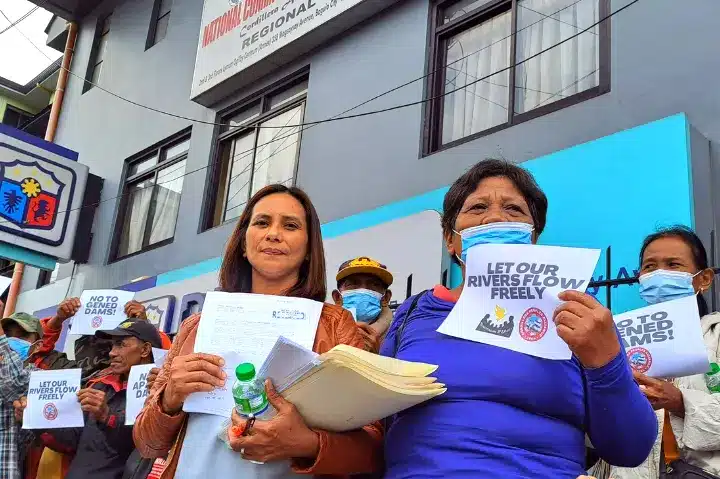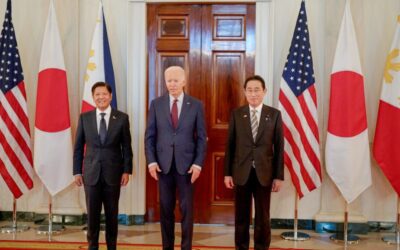By KIMBERLIE QUITASOL
www.nordis.net
BAGUIO CITY— Community leaders from the municipalities of Balbalan and Pinukpuk trooped to the National Commission on Indigenous Peoples (NCIP) regional office on March 13 to reiterate their opposition to the proposed dam projects along the Saltan river.
Members of the Limos tribe from Pinukpuk also submitted a petition to nullify the February 9 consensus building meeting facilitated by NCIP for the Saltan D hydroelectric power project.
The activity was part of this year’s International Day of Action Against Dams and for Rivers (IDAAD) commemoration.
The Department of Energy has awarded five dam projects along the Saltan River and its tributaries traversing the two towns. JBD Water Power Inc. (JWPI) is the proponent for three facilities – the 49-megawatt Saltan D Hydroelectric Power Project (HEPP), 45MW Saltan E HEPP, and the 40MW Mabaca HEPP along the Cal-oan River.
The projects will impact the ancestral domains of six tribes in Kalinga – the Limos in Pinukpuk and Daoangan, Mabaca, Poswoy, Salogsog, and Buaya in Balbalan.
Saltan E HEPP and Mabaca HEEP are currently undergoing the free, prior, and informed consent (FPIC) process, a requirement for projects in indigenous peoples’ lands and facilitated by NCIP.
Source of tension
The projects are facing strong opposition from members of the affected tribes. They have also caused tension among tribe members and between neighboring tribes.
“We are opposing the dam project because it will adversely affect the Saltan River, where we catch freshwater bounties and get other food like watercress and edible ferns, for free,” said Santos Laoagan.
Barangay Apatan, he said, is located downstream of the proposed location of the dam reservoir.
“This makes it more dangerous for communities like us who are downstream and along the riverbanks,” he said.
They fear massive flooding of their rice fields when the dam releases water during heavy rains. They also fear the dam will degrade their river.
“The dam will not benefit our communities,” he stressed.
In their petition, the petitioners asked the NCIP to nullify the result of the February 9 consultative community assembly (CCA). They alleged the process was “totally manipulated/railroaded.” According to them, only a handful of officials from the other barangays were present at the meeting.
NCIP and tribe members originally scheduled the meeting to decide whether to reject or accept the project on September 27 last year. However, early morning of the same day, NCIP Kalinga informed them that the activity would not push through.
In a November 2022 interview, NCIP Kalinga said the barangay captain of Limos proper requested to postpone the activity citing issues within the community that they still have to resolve.
However, residents opposing the project believe it was a means to give the company and its supporters time to subvert the opposition.
Growing enmity
The February 9 decision-making process, resulting in a resolution of consent for the project, has increased animosity between those who favor and oppose JPWI’s proposal.
Laoagan said they filed a petition to protest the activity since not all the affected barangays of the tribe were present.
“We are filing a petition against the meeting because we were not properly represented. The meeting was also held in (Barangay) Allaguia, which is not an affected area,” he said.
The dam project impacts five of the eight barangays within the Limos tribe’s ancestral domain— Limos, Apatan, Allaguia, Baay, and Asibanglan. The other barangays of the tribe are Bayao and Taga.
During a dialogue with NCIP Cordillera Director Atanacio Addog after the petition filing, the petitioners said that barangay officials, who favor the project, “directly influenced” the decision-making process.
Elma Awingan-Tuazon, who attended the meeting, noted that JWPI coordinator Jong Biluwan was present during the meeting.
She also told the director about the tense situation in communities. According to her, it has negatively affected the relationship among family members and between tribes, with some expressing disgust and resentment toward each other.
Tuazon, a Limos tribe member and former councilor, is also the lead convenor of Sumkad ti Umili para iti Matagoan, Karbengan, Aglawlaw ken Dayaw (SUMKADD), a broad environmental alliance in Kalinga. The acronym is also the Kalinga term for “rise and resist.”
Take action
Aside from investigating their concerns, Tuazon, with Poswoy tribe member Herman Gangot urged Addog to take decisive action to prevent the tension in the community from escalating. They also asked the official to warn JWPI from further influencing the community to give their consent.
Poswoy already rejected Saltan E on September 28 last year. However, Gangot alleged that JWPI is using underhanded tactics to convince people to consent. He is concerned that the company is preparing its motion for reconsideration.
“We are waiting for the second round so we could reaffirm our decision to reject the project,” he said.
Under the FPIC guidelines, once the community rejects the project, the proponent has 15 days to file a motion for reconsideration upon receipt of the resolution of non-consent.
Addog said he would direct their Kalinga office to comment on the issues raised in the petition. He explained that, like the companies, indigenous communities could also appeal to consensus-building results in the FPIC process. According to him, the tribe can also call a meeting to come up with a consensus on whether to affirm or reject the result of the February 9 meeting.
He also said they would write the company but added that they “will not be there every minute to guard them.” He said it is ultimately up to the community to watch out for each other.
Addog said there are sanctions if NCIP finds that the company’s actions violate the FPIC guidelines.
“We cannot speculate at the moment because we do not know what is exactly happening, but there are safeguards against those who are trying to influence (the decision of the indigenous people),” he said.
As to the reported growing tension in the community, the director believes that the tribes can sort it out themselves. He expressed trust banking on the strong indigenous social structure, which includes the dispute resolution process of the Kalinga tribes. # nordis.net / with reports from Sherwin De Vera










0 Comments